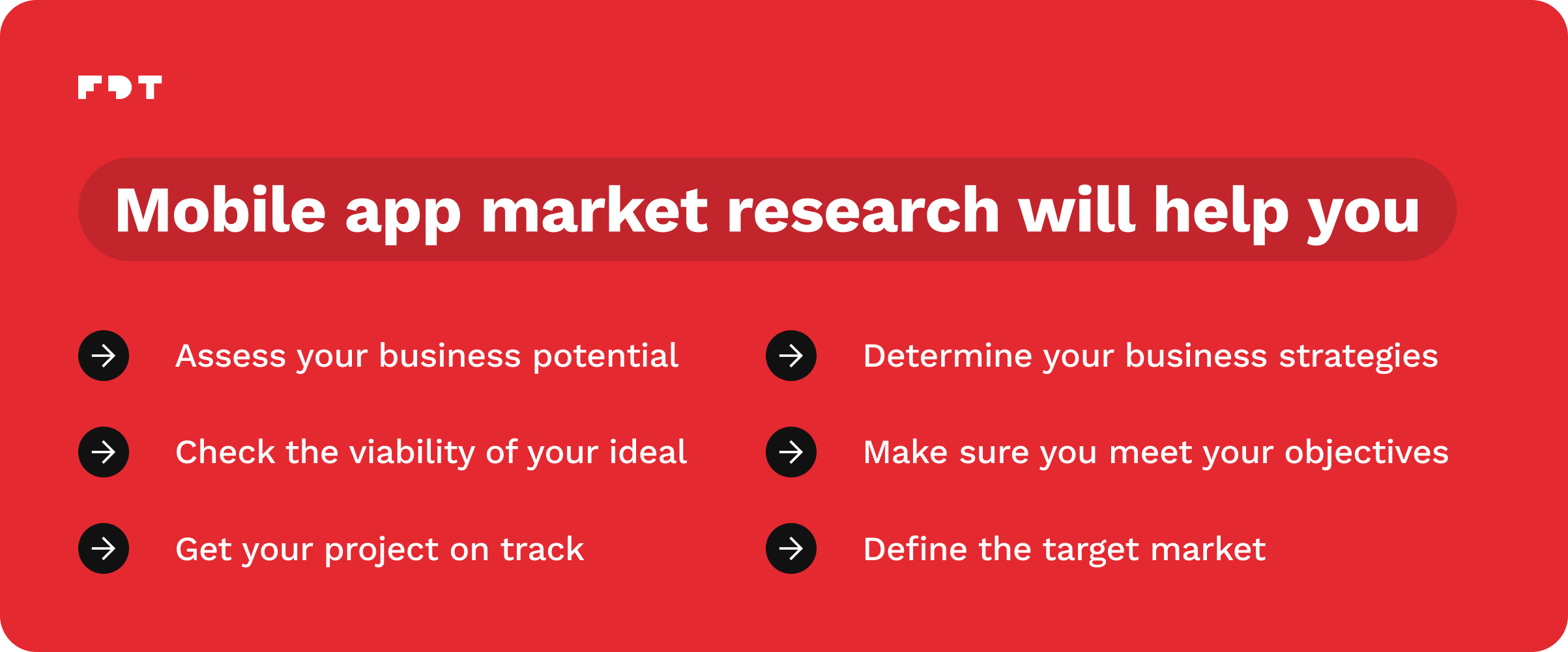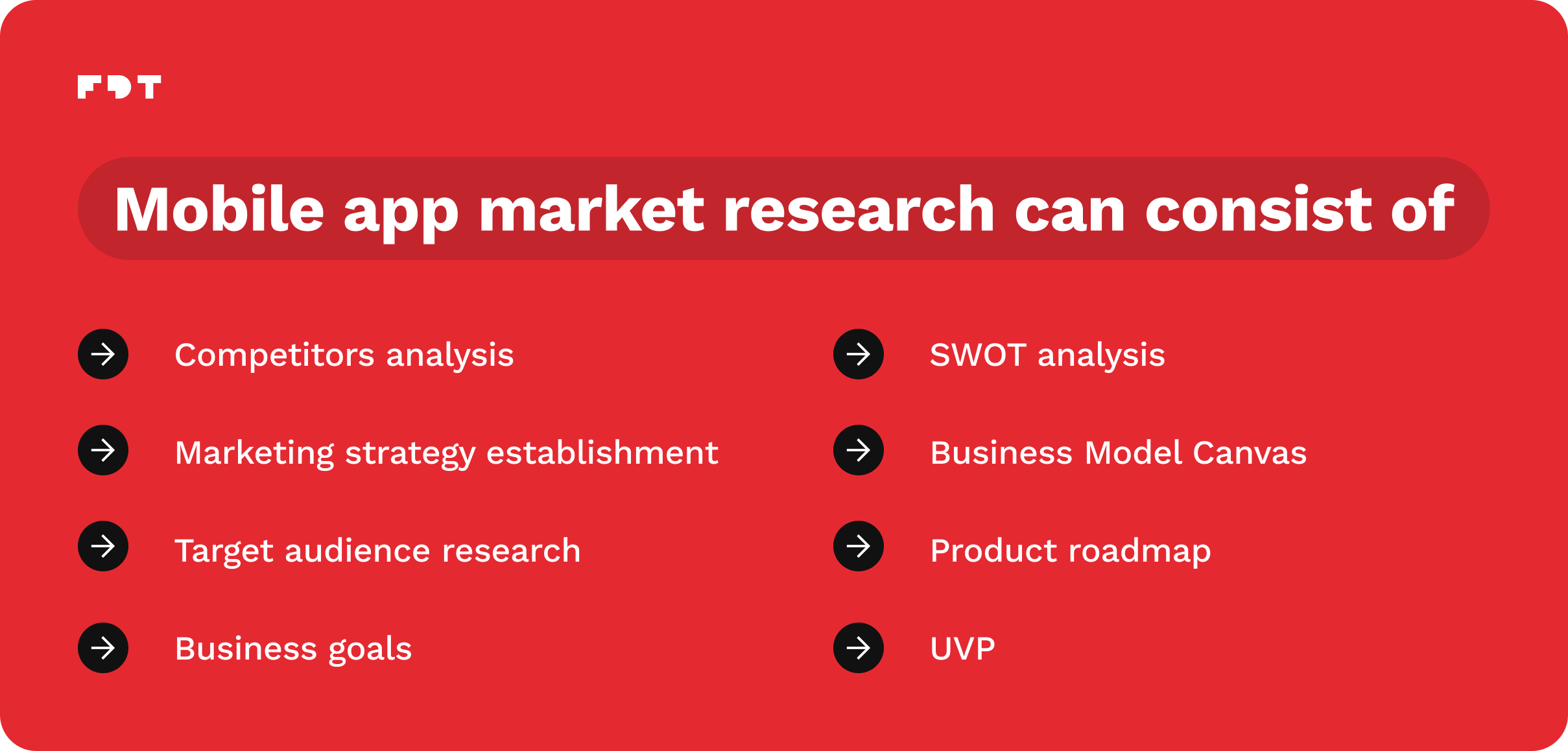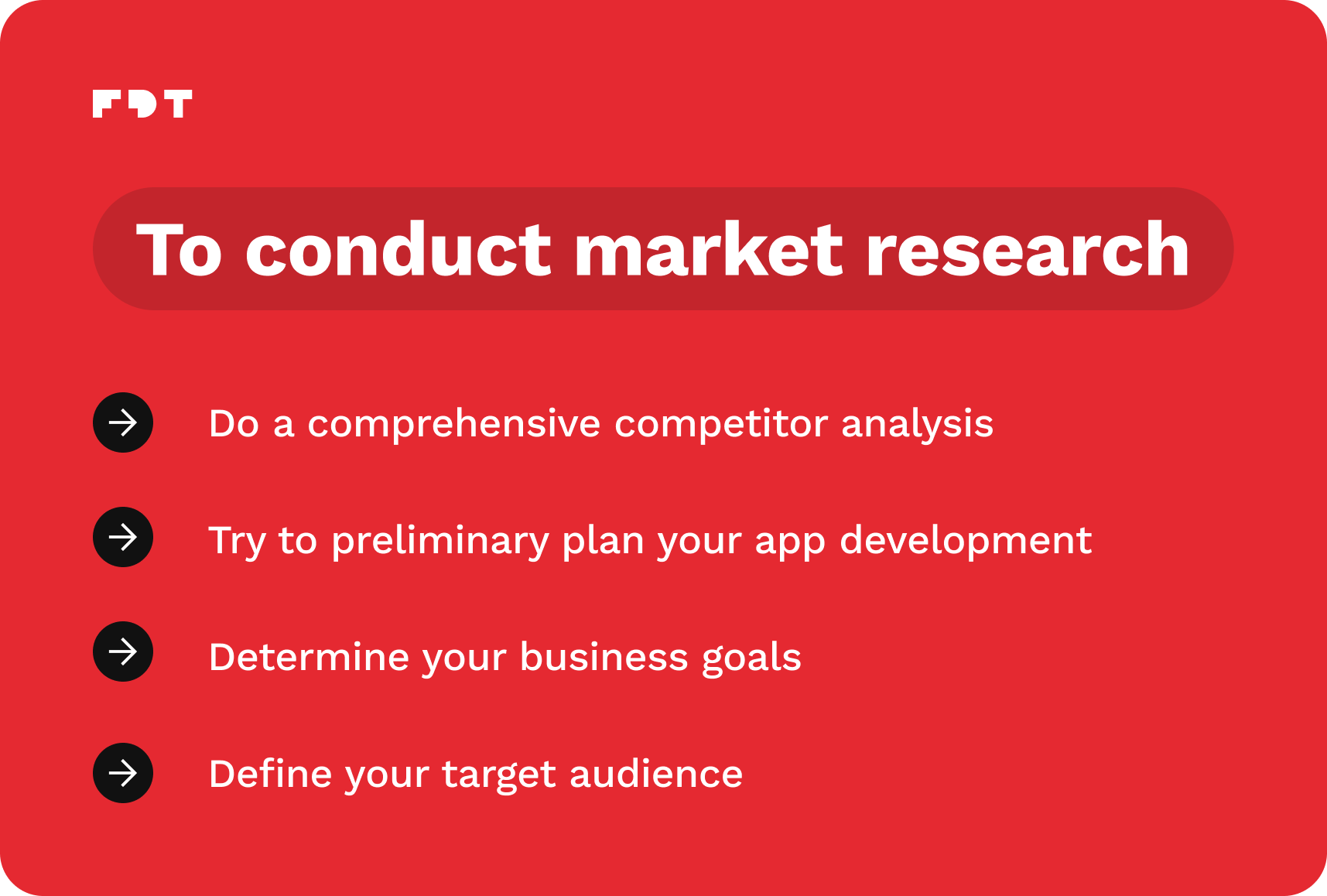
Mobile app market research strategies
If you’re starting working on your mobile app, you probably know that one of the first phases of the process should be market research. Well, if you didn’t know, it’s time to find out:
- What needs to be done at the initial stage of your project
- Why it’s so important to do the market research
- What the different stages and strategies of app market research are – how to conduct market research.
You’ll find all this information in this article!
Also, if you’re looking for a new mobile app idea, the step-by-step guide through proper market research might help you find it.
Contents
What is mobile app market research?
Mobile app market research might consist of lots of different elements and stages, depending on your purposes and your idea. Generally, app market research is looking for answers to questions that will help you understand if your idea has business potential and that will give you a hint on what to do to make your project a real success.
Below you’ll find the questions to be answered to accomplish your objectives along with a guide on how to conduct market research.
Why is it important to conduct market research for mobile app development?
When you begin to work on your mobile app development, it’s essential to check the viability of your idea and therefore to check if the project has a chance to become successful and profitable. Every new idea, new business and the new product has objectives. During the market research, you simply check if implementing your idea is worth your time and investment. If it turns out it’s not going to bring you profits, you’ll be able to resign and not lose any more time and money.

Mobile app market research stages & strategies
Let’s have a look at possible stages of the market research and strategies you can follow to make sure that your market research brings you successful results.

Competitors research
One of the most important elements of market research in every case is the competitors' research and analysis. Doing this is essential to simply be able to stand out. Competitive analysis is in-depth research of competing apps that will help you find flaws in these products and lacks in features, and get to know their audience needs.
Questions you need to answer when doing the competitor analysis are:
- Who are your competitors?
- What are the names and features of your competitive apps?
- What are the industry standards and trends?
- Which features in competitive apps are essential?
- What are the lacks in competitors' features?
Competitive analysis template
In the Resources section on our website, you can find the competitive analysis template containing all the necessary elements. All you need to do is download the template and fill it in.
Competitive analysis will help you:
- Identify opportunities to outperform the competition by knowing their strengths and weaknesses and using this knowledge to determine your business strategy,
- Find out what the industry standards are – the market research is crucial to get to know what are the industry trends and what product or service is actually needed,
- Determine what is valuable to your target market – apart from knowing who are the users of your competitors' products, you’ll find out what are their needs and what value should be provided to them,
- Get to know how you can stand out from the crowd with your solution so that you become a strong competitor to all the similar apps and the users won’t hesitate to choose yours.
App features
When doing the competitive analysis, you list competitors’ apps features and what lacks in them. With this knowledge, you can start planning features in your app as well. By taking a fresh approach to competitors’ compared apps, you'll know better what features you want to introduce in your product. Try to list the features you consider important in your app in as much detail as possible.
Defining the target audience
It’s also essential in every market research to define the target audience of your mobile app. It’s them who you’re creating the app for, so it has to meet their needs.
Questions you need to answer when defining the target audience are:
- Who are/will be the users of your mobile app?
- How many users can your app have?
- Where do users of your app live?
- What are their preferences?
User persona
An especially helpful element when defining the target audience of your app is creating a user persona. A user persona is your ideal type of user. It’s a user for whom you built the app and whose preferences should drive your ideas for the mobile app functionality. It includes basic information about the user, like name and age, bio, their goals, motivations and needs, pain points, and frustrations.
User persona template
Another helpful tool from the Resources section is a user persona template, that will help you identify every important aspect regarding the users of your mobile app that you’d like to encourage to download your app. You can get it for free and fill in the needed information.
Determining your business goals
Another stage of the market research includes determining your business goals related to the creation of the app. This is essential to be able to define all the requirements for the mobile app features.
Questions you need to answer when determining your business goals are:
- What do I want to achieve with my business?
- What are the main reasons I decided to create the app for my business?
- How and why did I come up with a new app idea?
SWOT analysis
SWOT analysis is one of the basic methods of strategic analysis that’s helpful for determining business goals. It can be used in different areas such as: sales, marketing, finance, production, research and development. In case of market research, it helps you find out what should be used, changed, modified and avoided in your business plan and concerning your mobile app idea.
SWOT stands for:
- Strengths – what are the strongest parts of your app idea? How to take advantage of them?
- Weaknesses – what weaknesses will you need to overcome? What challenges are caused by these weak points?
- Opportunities – what opportunities stand ahead of your mobile app? And how can you benefit from them?
- Threats – are there any threats to your business? Or maybe for the whole mobile app development industry? How to deal with them?
Business Model Canvas
Just like with any other business, when planning a mobile app development, it’s worth creating a business model canvas. It’s kind of a template for your business model, where you list the most important elements of your business, such as:
- Key partners
- Key activities
- Value propositions
- Key resources
- Customer relationship
- Customer segments
- Channels
- Cost Structure
- Revenue Streams.
You can think: why put it on paper when I know all these things about my business and I’m able to manage it. What does it bring to market research? Well, it can bring a lot e.g. when compared to your competitors, as well as help you create a business plan.
Every area of your business, also if it’s an app idea, needs to be analyzed and compared to be able to assess, among others:
- If relationships with your key partners will be long-term
- What your customer relationships look like
- Who your customers are
- How you gain revenue
- What costs you have to and/or will have to face.
Unique Value Proposition
Every app idea needs to be supported by the Unique Value Proposition (UVP). UVP shows what makes the mobile app stand out on the market, why it’s better than competitors. It’s also kind of a promise to users and/or customers. It points to a specific benefit they will receive if they decide to purchase or download the app. UVP is a fundamental value of every enterprise.
Questions you need to answer when determining your business goals are:
- Is your idea unique enough to encourage users to take advantage of your solution?
- Will the mobile app be really valuable for users? Will it contain features they need?
- How is your idea different from any other?
- What unique feature can you offer to users?
Marketing strategy
It’s not too early. The marketing strategy can really be thought out at the market research stage. That’s also because it can be compared to competitors’ strategies. Mobile apps without a good marketing strategy have little chance to succeed because there is an enormous amount of other apps on the market. The size of the competition simply won’t let you skip the subject of mobile marketing even if your app is really impressive and useful. And finally, this will also help you determine your business goals.
Setting the marketing plan for your product should include answering the following questions:
- What is the most important value of the mobile app?
- How does your product stand out?
- How is it better than other mobile apps on the market?
- How can you meet the specific needs of your target audience?
When analyzing your competitors' marketing strategies during the market research, don’t forget to browse their social media. Lots of marketing is happening there nowadays!
Product roadmap
Developing a product can be difficult. Without a properly established long-term product strategy and goals, prioritizing and managing your app development can be chaotic. There are many people involved in building a product – engineers, product managers, marketers, sales team... Without a clear vision, you won't be sure that the whole team knows which direction to go.
With help comes a product roadmap. It’s a shared source of truth that outlines the vision, direction, priorities, and progress of a product over time. It's a plan of action that aligns the organization around short and long-term goals for the product or project and ways to achieve them. Proper market research will also help you prepare a product roadmap for your mobile app development.
The product roadmap also helps to answer the questions about:
- Your goals for the app development
- Your product vision
- The monetization method you choose
- Market positioning
- User personas
- Competitive analysis.
Conclusion
Hopefully, you understand now the power and importance of market research for mobile app development. Finding the target audience, analyzing your competitors, thinking about your business goals and doing everything related to this is just essential to make you feel confident about your product’s success.
Without in-depth market research and analysis, your mobile app idea can be just an idea and never turn into a fully-fledged business plan.
To conduct market research:
- Do a comprehensive competitor analysis
- Try to preliminary plan your app development
- Determine your business goals
- Define your target audience.





